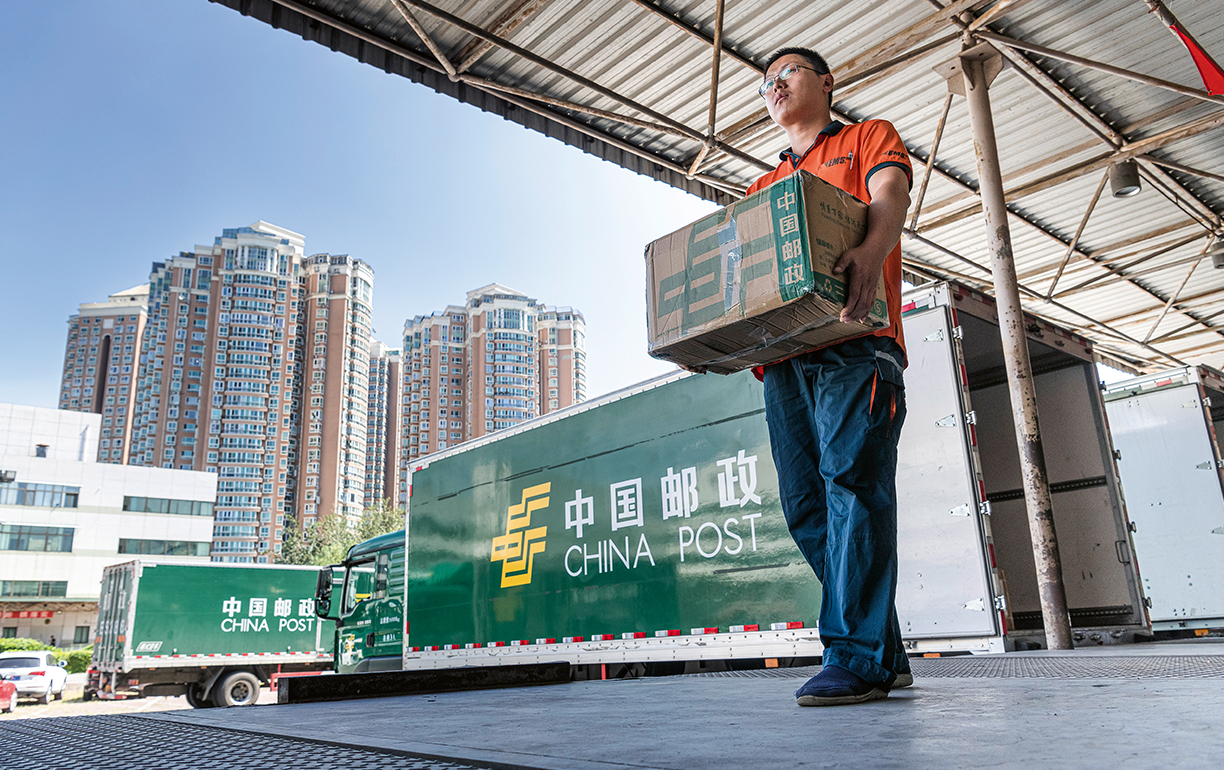
Digital speed.
One of Lufthansa Cargo’s biggest freight customers in the entire Asia-Pacific region is actually not a typical freight customer, but… a postal company. Each week, and from Shanghai alone, the China Post Group Corporation (China Post) ships over 100 tons of letters and parcels of all sizes on board Lufthansa Cargo aircraft to Europe. This amounts to the entire carrying capacity of a fully loaded Boeing 777F. It is a sign of the times that letters make up a very small proportion of the overall volume, although important bank documents are still carried in this way. The bulk consists of consignments of goods ordered online by consumers located on the other side of the globe.
The enabler for this trend is e-commerce: in 2018 the government-owned company with the green and yellow logo shipped over 100,000 tons – mostly parcels – to Europe using airfreight. A considerable amount of this volume was moved by Lufthansa Cargo. Despite the current slow-down in growth in the airfreight market, China Post anticipates a further increase in traffic by ten percent in 2019 compared with the previous year. What is more, the company expects growth rates in this segment to exceed those of the rest of the international trade in goods even in the longer term.
Whether it’s a pencil case, a mobile phone accessory or a household item – anyone ordering goods online today via Alibaba, Amazon or Ebay, for example, can be fairly certain that their order will be shipped directly from China. Even smaller and medium-sized European online traders often procure their goods directly in China whenever they receive orders. “We are still the world’s factory,” said Wen Shaoqi, Vice President, China Post Group, during the visit of a Lufthansa Cargo delegation in Beijing in August this year, not without pride.
However, unlike conventional freight shipments, China Post’s transportation of goods ordered via e-commerce is governed by the framework of the processes agreed upon by the postal companies organized in the almost 150-year-old Union Postale Universelle (UPU). These consignments travel without the need for air waybills, for example. On arrival at the destination country, they are also subject to simplified customs clearance. And while the postal bags and parcel stacks containing the consignments from China Post are tied up on pallets, making them look just like conventional standard freight from the outside, on arrival in Frankfurt these pallets are not broken up for onward shipping at the Lufthansa Cargo Center as is usually the case; instead, they are taken to the Airmail Center where the distribution of mail and parcels is part of a specialized and highly automated process.
However, unlike conventional freight shipments, China Post’s transportation of goods ordered via e-commerce is governed by the framework of the processes agreed upon by the postal companies organized in the almost 150-year-old Union Postale Universelle (UPU).
These consignments travel without the need for air waybills, for example. On arrival at the destination country, they are also subject to simplified customs clearance. And while the postal bags and parcel stacks containing the consignments from China Post are tied up on pallets, making them look just like conventional standard freight from the outside, on arrival in Frankfurt these pallets are not broken up for onward shipping at the Lufthansa Cargo Center as is usually the case; instead, they are taken to the Airmail Center where the distribution of mail and parcels is part of a specialized and highly automated process.
So it is not only as a result of the large tonnage that China Post is a very special customer for Lufthansa Cargo, but also because of these special processes. This is why in August this year, Dorothea von Boxberg, Chief Commercial Officer at Lufthansa Cargo, traveled to the China Post head office for the second time already in her still fairly recent tenure in order to talk about what has already been achieved and also to discuss the details of this special cooperative venture in the future. This visit had been agreed by both partners in their bilateral cooperation, which began in October 2016 with a Memorandum of Understanding (MOU) and reached its first preliminary milestone two years later with a Letter of Intent (LOI) for the purchase of 100 tons of freight capacity on the Shanghai–Frankfurt route.
“China Post is an extremely important customer to us, a customer who exhibits considerable stability even during periods of weaker demand, and stands by prior commitments in their entirety,” said von Boxberg. “China Post also holds out exciting prospects for the continued development of our services for shippers in the e-commerce segment.”
|
Whether it’s a pencil case, a mobile phone accessory or a household item – anyone ordering goods online today via Alibaba, Amazon or Ebay, for example, can be fairly certain that their order will be shipped directly from China. Even smaller and medium-sized European online traders often procure their goods directly in China whenever they receive orders. “We are still the world’s factory,” said Wen Shaoqi, Vice President, China Post Group, during the visit of a Lufthansa Cargo delegation in Beijing in August this year, not without pride. However, unlike conventional freight shipments, China Post’s transportation of goods ordered via e-commerce is governed by the framework of the processes agreed upon by the postal companies organized in the almost 150-year-old Union Postale Universelle (UPU). These consignments travel without the need for air waybills, for example. On arrival at the destination country, they are also subject to simplified customs clearance. And while the postal bags and parcel stacks containing the consignments from China Post are tied up on pallets, making them look just like conventional standard freight from the outside, on arrival in Frankfurt these pallets are not broken up for onward shipping at the Lufthansa Cargo Center as is usually the case; instead, they are taken to the Airmail Center where the distribution of mail and parcels is part of a specialized and highly automated process.
|
So it is not only as a result of the large tonnage that China Post is a very special customer for Lufthansa Cargo, but also because of these special processes. This is why in August this year, Dorothea von Boxberg, Chief Commercial Officer at Lufthansa Cargo, traveled to the China Post head office for the second time already in her still fairly recent tenure in order to talk about what has already been achieved and also to discuss the details of this special cooperative venture in the future. This visit had been agreed by both partners in their bilateral cooperation, which began in October 2016 with a Memorandum of Understanding (MOU) and reached its first preliminary milestone two years later with a Letter of Intent (LOI) for the purchase of 100 tons of freight capacity on the Shanghai–Frankfurt route. “China Post is an extremely important customer to us, a customer who exhibits considerable stability even during periods of weaker demand, and stands by prior commitments in their entirety,” said von Boxberg. “China Post also holds out exciting prospects for the continued development of our services for shippers in the e-commerce segment.” |
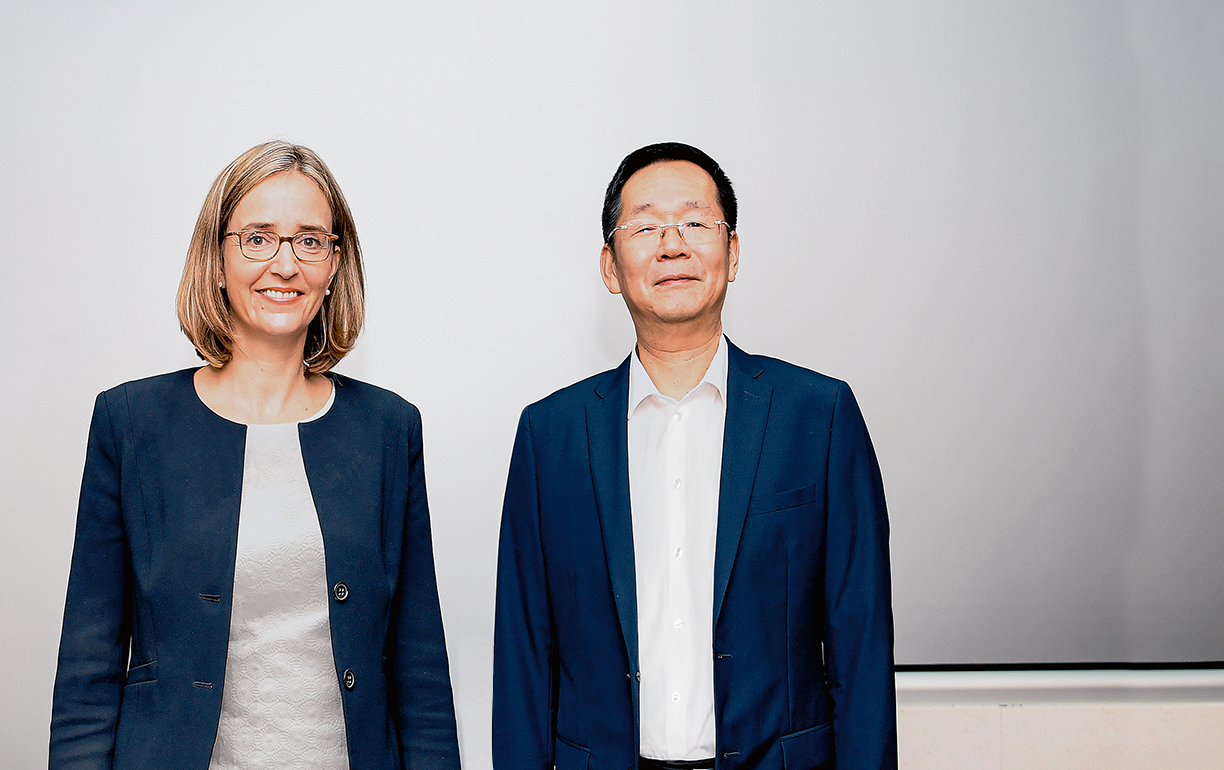
Becoming more digital.
Her host, Wen Shaoqi, welcomed von Boxberg in a gigantic conference room on the 4th floor of the Beijing postal headquarters. “Lufthansa Cargo is becoming an increasingly important partner for China Post,” underscored Wen. “It is a freight airline that not only has a global network, but in addition to offering high-volume belly capacities it also operates its own freighters through important Chinese gateways such as Beijing, Shanghai and Hong Kong. Our cooperative venture likewise gives us the opportunity to jointly develop the digital aspects of the cross-border business, from making bookings and tracking all the way through to billing.”
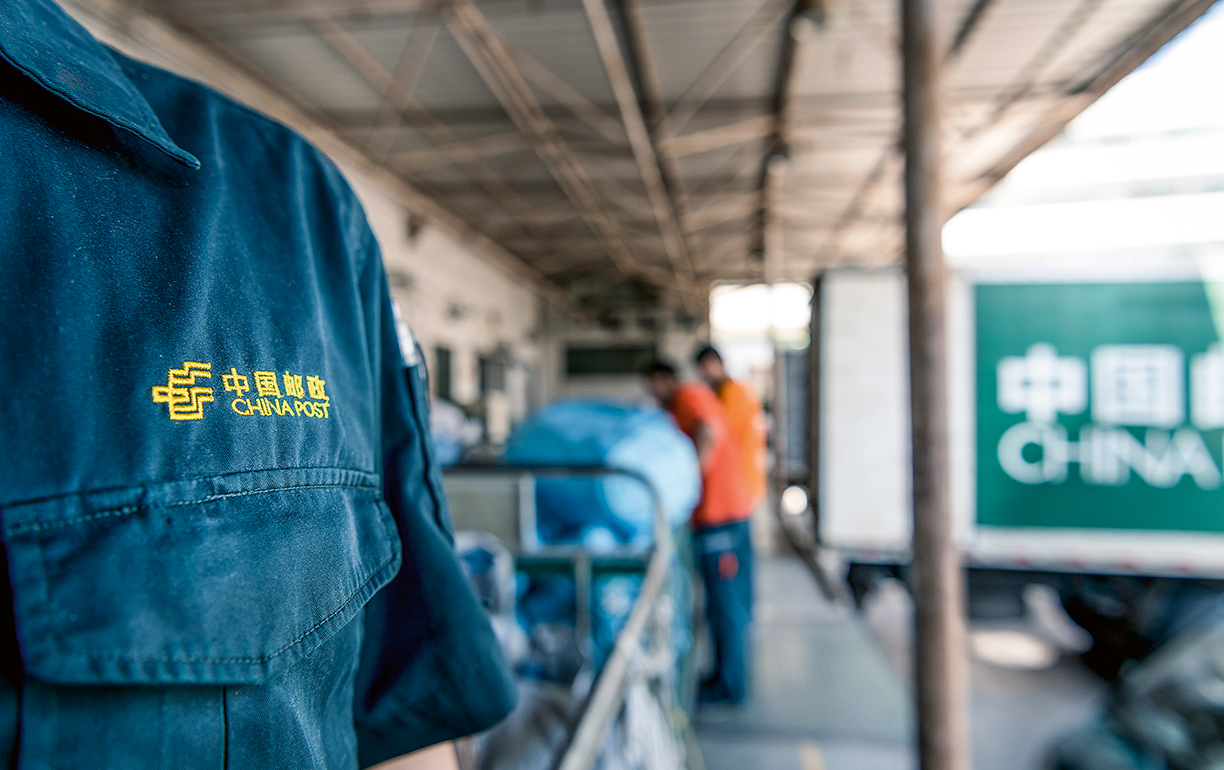
The 22-story headquarters of China Post where the meeting took place is located in the western part of Beijing, situated amidst other buildings owned by leading companies in the Chinese economy. The headquarters controls the activities of about one million China Post employees. Spanning the entrance is a motto that roughly translates as: “If the people have faith in the strength of the country, then the nation will be full of hope.”
In other words, China Post is an enterprise committed to making its contribution to the country’s advancement. The company’s top priority is still to achieve full coverage of this giant empire, which takes in an area 25 times larger than Germany. China Post invests billions of yuan to improve its infrastructure and provide more and more parts of the Chinese economy and its more than 1.3 billion people with access to international postal and goods traffic.
Up-to-Date Tracking.
Given these challenges faced in their own country, the executives in charge are delighted to have found a competent partner in Lufthansa Cargo to assist them in their efforts to boost the efficiency of cross-border airfreight shipments. “What our customers expect from us are reliable delivery times, competitive pricing and up-to-date tracking information,” explained Ma Zhanhong, Deputy Managing Director of the China Post subsidiary China Postal Express & Logistics, during the meeting of the top representatives of the two companies. “Especially in the provision of data, streamlined customs clearance service and the service quality on the so-called last mile, there is still potential for improvement that we believe we can exploit even better in cooperation with Lufthansa Cargo,” added Ma. “Ideally, our customers should be able to trace everything down to the level of individual packages at all times.”
At Lufthansa Cargo everything is already geared towards achieving this objective: the freight airline’s aim is to have customers perceive Lufthansa Cargo not only as a dependable airport-to-airport carrier, but also as a fully digitalized operation. Easy-to-use Application Programming Interfaces (APIs) have already been provided to let customers connect their own IT systems to the booking, tracking and billing tools of Lufthansa Cargo, and the quality of the data exchanged in this way is constantly improving. “We will be pleased to meet any additional challenges China Post cares to present us with in the future,” affirmed von Boxberg.
The Board Member and her hosts from China Post also established a working group with the task of investigating the potential of a cooperative venture between China Post and heyworld. This Lufthansa Cargo subsidiary (see article) specializes in IT-based logistics solutions for customers engaged in cross-border e-commerce. “In terms of pricing structure and service level, our start-up heyworld is positioned right in the middle between the services offered by the integrators and the postal companies,” explained Dorothea von Boxberg. “Customers working with heyworld receive a service that is quicker than that provided by postal companies, and cheaper than those of the major international parcel carrier services. In addition, heyworld offers its customers door-to-door services with cross docking and full data transparency along the entire transport chain. From my perspective this would make a perfect fit with China Post’s ambition to further optimize their services and their efficiency.”
With 13,120 square meters of storage space and the capacity for handling 16.5 million parcels per month, the Wangjing International Mail Processing Center, located about half an hour’s drive from Beijing’s old airport PEK, is one of China Post’s largest air cargo hubs in the capital. As is true for many things throughout this giant empire, the operation still involves a great deal of manual labor. However, the management of China Post is currently engaged in the process of learning all about fully and partially automated systems of the kind relied on by Lufthansa Cargo, for example at the Airmail Center in Frankfurt. Through this and the other three main hubs the freight airline Lufthansa Cargo manages to process 200 tons of “mail” every day – 80 percent of which are e-commerce consignments.
The people in charge at China Post are well aware that it is only through automation and digitalization that the challenges brought about by the growth in e-commerce can be tackled successfully in the long term. The volumes handled rise rapidly during every peak season. The Singles’ Day (11/11), Black Friday (this year on 29/11) and Christmas rushes result in activities hotting up at China Post in November and early December. “In cross-border goods traffic, we might see an increase in volume of over 50 percent from one day to the next,” said Ma Zhanhong.
Up-to-Date Tracking.
|
Given these challenges faced in their own country, the executives in charge are delighted to have found a competent partner in Lufthansa Cargo to assist them in their efforts to boost the efficiency of cross-border airfreight shipments. “What our customers expect from us are reliable delivery times, competitive pricing and up-to-date tracking information,” explained Ma Zhanhong, Deputy Managing Director of the China Post subsidiary China Postal Express & Logistics, during the meeting of the top representatives of the two companies. “Especially in the provision of data, streamlined customs clearance service and the service quality on the so-called last mile, there is still potential for improvement that we believe we can exploit even better in cooperation with Lufthansa Cargo,” added Ma. “Ideally, our customers should be able to trace everything down to the level of individual packages at all times.” At Lufthansa Cargo everything is already geared towards achieving this objective: the freight airline’s aim is to have customers perceive Lufthansa Cargo not only as a dependable airport-to-airport carrier, but also as a fully digitalized operation. Easy-to-use Application Programming Interfaces (APIs) have already been provided to let customers connect their own IT systems to the booking, tracking and billing tools of Lufthansa Cargo, and the quality of the data exchanged in this way is constantly improving. “We will be pleased to meet any additional challenges China Post cares to present us with in the future,” affirmed von Boxberg. The Board Member and her hosts from China Post also established a working group with the task of investigating the potential of a cooperative venture between China Post and heyworld. This Lufthansa Cargo subsidiary (see also the article) specializes in IT-based logistics solutions for customers engaged in cross-border e-commerce. “In terms of pricing structure and service level, our start-up heyworld is positioned right in the middle between the services offered by the integrators and the postal companies,” explained Dorothea von Boxberg. |
“Customers working with heyworld receive a service that is quicker than that provided by postal companies, and cheaper than those of the major international parcel carrier services. In addition, heyworld offers its customers door-to-door services with cross docking and full data transparency along the entire transport chain. From my perspective this would make a perfect fit with China Post’s ambition to further optimize their services and their efficiency.” With 13,120 square meters of storage space and the capacity for handling 16.5 million parcels per month, the Wangjing International Mail Processing Center, located about half an hour’s drive from Beijing’s old airport PEK, is one of China Post’s largest air cargo hubs in the capital. As is true for many things throughout this giant empire, the operation still involves a great deal of manual labor. However, the management of China Post is currently engaged in the process of learning all about fully and partially automated systems of the kind relied on by Lufthansa Cargo, for example at the Airmail Center in Frankfurt. Through this and the other three main hubs the freight airline Lufthansa Cargo manages to process 200 tons of “mail” every day – 80 percent of which are e-commerce consignments. The people in charge at China Post are well aware that it is only through automation and digitalization that the challenges brought about by the growth in e-commerce can be tackled successfully in the long term. The volumes handled rise rapidly during every peak season. The Singles’ Day (11/11), Black Friday (this year on 29/11) and Christmas rushes result in activities hotting up at China Post in November and early December. “In cross-border goods traffic, we might see an increase in volume of over 50 percent from one day to the next,” said Ma Zhanhong. |
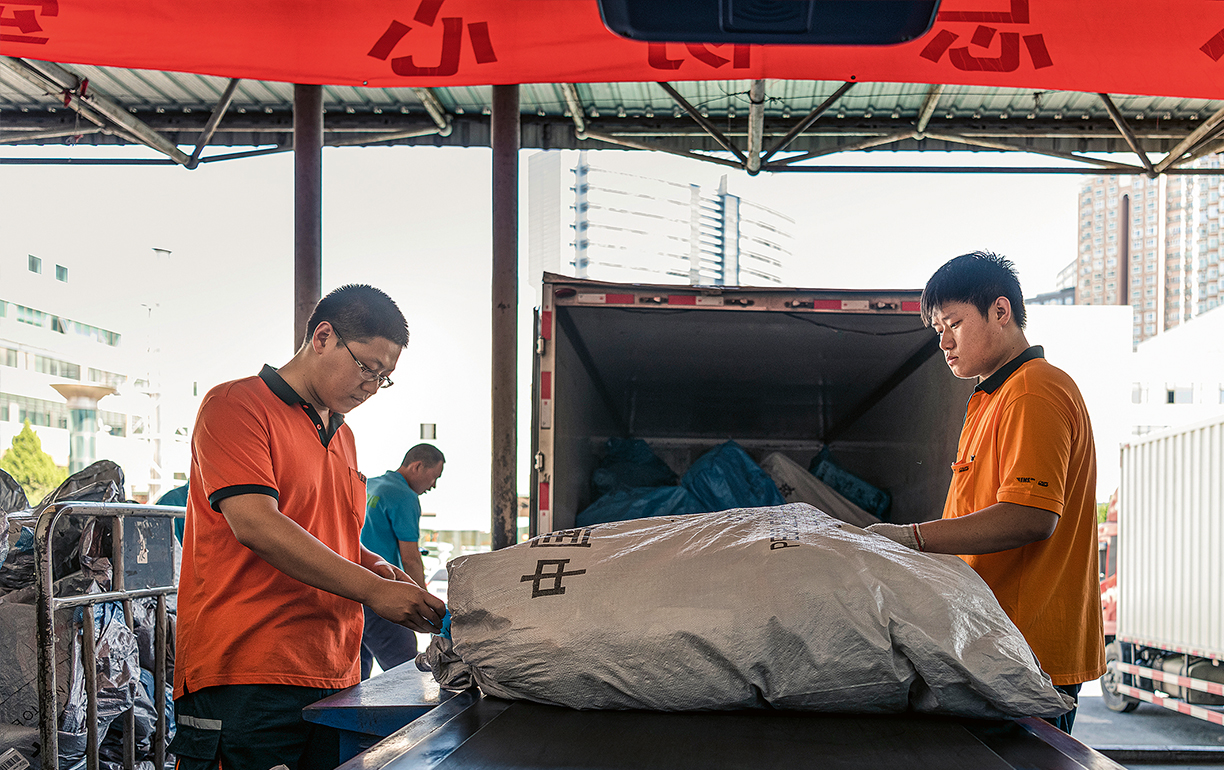
Manufactured by order.
Other trends driving the growth of China Post, and to which the company must adapt, are the increasing personalization of products – the growing number of products that can only be manufactured and made ready for delivery after an order has been received – and the fact in the future Chinese manufacturers will be receiving increasing numbers of individual orders, rather than bulk orders. “We at China Post want to respond to all these trends by providing efficient solutions,” underscored Ma.
Conclusion: the number of Internet users worldwide today is 4.3 billion – and rising. The global logistics network has also improved in tandem with this development. This enables e-commerce giants like Amazon, Alibaba and Ebay to operate on a global scale. Yet e-commerce is also the business model for the future for small and medium-sized enterprises. “China will continue to play the leading role in this field, because the bulk of household and consumer goods will continue to be manufactured by us,” said Wen Shaoqi in summing up at the close of the meeting with Dorothea von Boxberg and her team.
“In this highly competitive environment in which many transport and logistics providers operate, China Post will continue to play a leading role globally, thanks to the company’s experience and large domestic market,” was von Boxberg’s assessment. “With the capacities we bring to this, with our digital know-how and our one-hundred percent commitment towards our customers, we will continue to assist China Post in exploiting this enormous potential even more efficiently in the future.”
|
Conclusion: the number of Internet users worldwide today is 4.3 billion – and rising. The global logistics network has also improved in tandem with this development. This enables e-commerce giants like Amazon, Alibaba and Ebay to operate on a global scale. Yet e-commerce is also the business model for the future for small and medium-sized enterprises. “China will continue to play the leading role in this field, because the bulk of household and consumer goods will continue to be manufactured by us,” said Wen Shaoqi in summing up at the close of the meeting with Dorothea von Boxberg and her team. |
“In this highly competitive environment in which many transport and logistics providers operate, China Post will continue to play a leading role globally, thanks to the company’s experience and large domestic market,” was von Boxberg’s assessment. “With the capacities we bring to this, with our digital know-how and our one-hundred percent commitment towards our customers, we will continue to assist China Post in exploiting this enormous potential even more efficiently in the future.” |
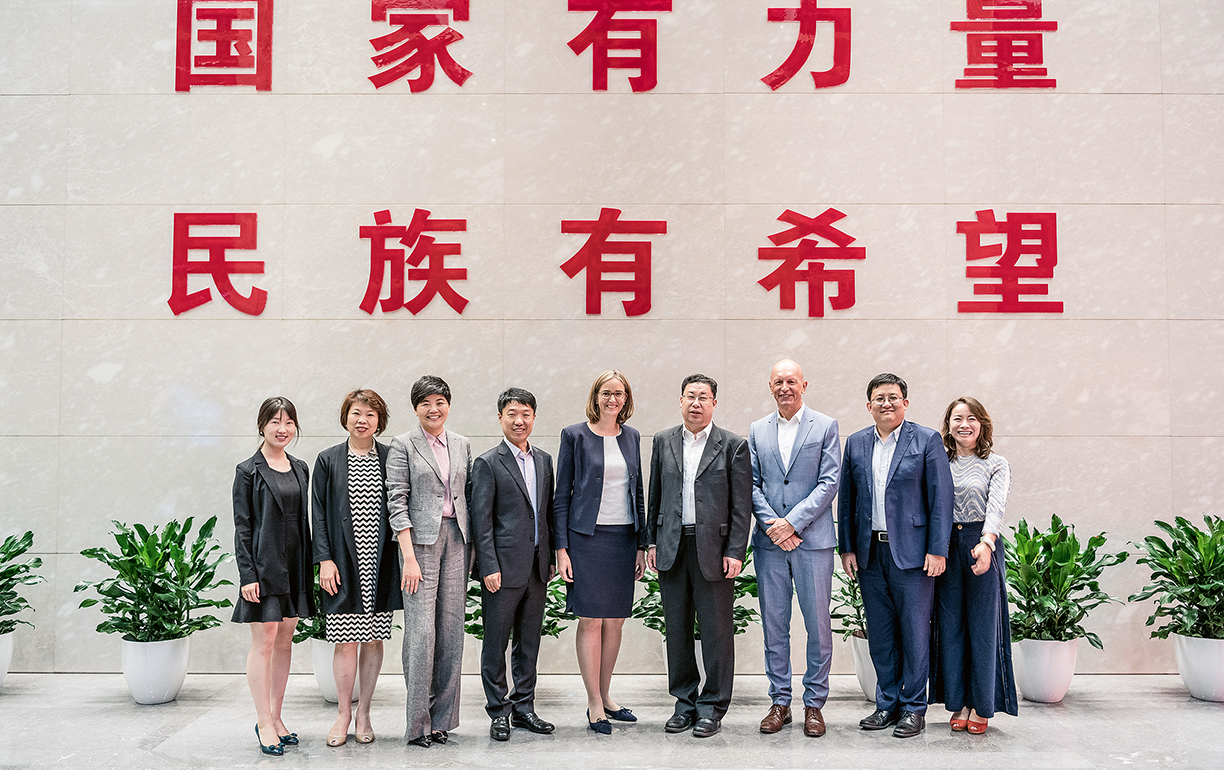
Center: Dorothea von Boxberg and, to her right, Ma Zhanhong, Deputy Managing Director of the China Post subsidiary China Postal Express & Logistics. Also on the photo (left side): Liu Shu Jun, interpreter at China Post, Dong Jie Li, Director North China, Janet Mi, Director Key Account Management Asia (both Lufthansa Cargo) as well as Hou Ji Zhou, Director International Network Operations at China Post. To Mr. Ma’s right: J. Florian Pfaff, Vice President Asia Pacific Lufthansa Cargo, Gao Lei, Project Manager at China Post, as well as Coco Sun, Key Account Manager at Lufthansa Cargo
